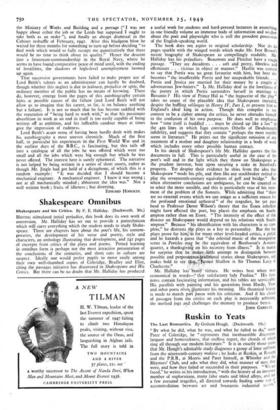Shakespeare Omnibus
Shakespeare and his Critics. By F. E. Halliday. (Duckworth. 30s.)
HAVING stimulated initial prejudice, this book does its own work of conversion. Mr. Halliday has set out to provide a pantechnicon which will carry everything which the student needs to study Shake- speare. There are chapters here about the poet's life, his contem- poraries, the development of his verse and poetry, style and characters, an anthology illustrating that development, and 242 pages of excerpts from critics of the plays and poems. Potted learning in omnibus form is perhaps not the most attractive presentation of the conclusions of the centuries, and short cuts to culture are suspect. Ideally one would prefer pupils to move easily among their own well-thumbed copies of Coleridge, Bradley and Eliot, citing the passages initiative has discovered in Shakespeare and His Critics. But there can be no doubt that Mr. Halliday has produced a useful work for.students and hard-pressed lecturers in assernblin4 in one friendly volume an immense body of information and wisdom about the poet and playwright who is still the proudest possession of the English-speaking world.
The book does not aspire to original scholarship. Nor do as pages sparkle with the winged words which make Mr. Ivor Brown's recent biography of Shakespeare so compellingly readable. Mt, Halliday has his prejudices. Beaumont and Fletcher have a rough passage. "They are decedents . . . soft and pretty, fibreless and effeminate . . . vicious in object or manner." Hazlitt was content to say that Portia was no great favourite with him but here she becomes "the insufferable Portia and her unspeakable friends. Portia and Jessica are married for their money by a couple of adventurous Jew-baiters." Is Mr. Halliday deaf to the loveliness of the poetry in which Portia surrenders herself in marriage Bassanio ? His view of Prince Hal as "the hypocrite of the play" takes no count of the plausible idea that Shakespeare intended, despite the baffling soliloquy in Henry IV, Part I, to present him as England's ideal king in action. Though this compiler is not content to be a cipher among the critics, he never obtrudes himself to the confusion of his own purpose. He does well to emphasise how "time itself is huddled . . . must be closed up like a fan" in the 400 lines in which Iago convinces Othello of Desdemoru's infidelity, and suggests that they contain "perhaps the most terrible scene in literature." He points out the significant omission of any treatment of a mother and daughter relationship in a body of work which includes every other possible human contact.
In his sketch of Shakespeare's life Mr. Halliday quotes the few documents in full. This is particularly useful in the case of ths poet's will and in the light which they throw on Shakespeare as the prudent investor, bent upon securing a stake in Stratford's property. Yet despite their evidence he shies from the idea that Shakespeare "made his pile, and then like any stockbroker retired to play the seventeenth-century equivalents of golf and bridge." But when alternative conclusions are ambiguous, he can be counted on to select the more sensible and this is particularly true of his treat- ment of the problem of the Sonnets. While admitting that "there are no external events which we can asaign as a sufficient reason for the profound emotional upheaval" of the tragedies, he yet pays heed to Professor Dover Wilson's theory that the Essex rebellion might have affected the poet, but places the emphasis on South- ampton rather than on Essex. "The intensity of the effect of this disaster on Shakespeare would depend on his relations with South- ampton." Because "his identification with his characters is so corn- plete," he distrusts the plays as a key to personality. But the last plays prove for him>is for many other level-headed critics, a pitfall, and he hazards a guess that "the celestial music of the recognition scene in Pericles may be the equivalent of Beethoven's A-minor quartet, a thanksgiving on his recovery from illness." It is matter for surprise that he makes -little attempt to distinguish between possible and preposterous,traditional stories about Shakespeare, and makes bold to say that- "Justice Shallow is Sir Thomas Lucy of Charlecote."
Mr. Halliday has Many virtues. He writes best when mast economical in words—" that satisfactory lady Pauline." His foot- notes contain fascinating information, and his tables are serviceable. His parallels with painting and his quotations from Hardy, Yeas and other poets oftenAluminate his meaning. His theatrical history is made to march pan passu with his criticism. And if his choice of passages from the critics on each play is necessarily arbitrary, the method jogs and challenges the memory to produce better.
JOHN GARELIS






































 Previous page
Previous page